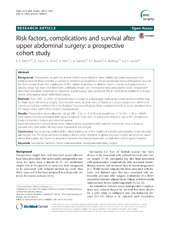Risk factors, complications and survival after upper abdominal surgery: A prospective cohort study
Aahlin, Eirik Kjus; Tranø, Geir; Johns, Neil; Horn, Arild; Søreide, Jon Arne; Fearon, Kenneth Christopher H.; Revhaug, Arthur; Lassen, Kristoffer
Peer reviewed, Journal article
Published version

Åpne
Permanent lenke
https://hdl.handle.net/1956/10845Utgivelsesdato
2015-07-07Metadata
Vis full innførselSamlinger
Originalversjon
https://doi.org/10.1186/s12893-015-0069-2Sammendrag
Background: Preoperative weight loss and abnormal serum-albumin have traditionally been associated with reduced survival. More recently, a correlation between postoperative complications and reduced long-term survival has been reported and the significance of the relative proportion of skeletal muscle, visceral and subcutaneous adipose tissue has been examined with conflicting results. We investigated how preoperative body composition and major non-fatal complications related to overall survival and compared this to established predictors in a large cohort undergoing upper abdominal surgery. Methods: From 2001 to 2006, 447 patients were included in a Norwegian multicenter randomized controlled trial in major upper abdominal surgery. Patients were now, six years later, analyzed as a single prospective cohort and overall survival was retrieved from the National Population Registry. Body composition indices were calculated from CT images taken within three months preoperatively. Results: Preoperative serum-albumin <35 g/l (HR = 1.52, p = 0 .014) and weight loss >5 % (HR = 1.38, p = 0.023) were independently associated with reduced survival. There was no association between any of the preoperative body composition indices and reduced survival. Major postoperative complications were independently associated with reduced survival but only as long as patients who died within 90 days were included in the analysis. Conclusions: Our study has confirmed the robust significance of the traditional indicators, preoperative serum-albumin and weight loss. The body composition indices did not prove beneficial as global indicators of poor prognosis in upper abdominal surgery. We found no association between non-fatal postoperative complications and long-term survival.
